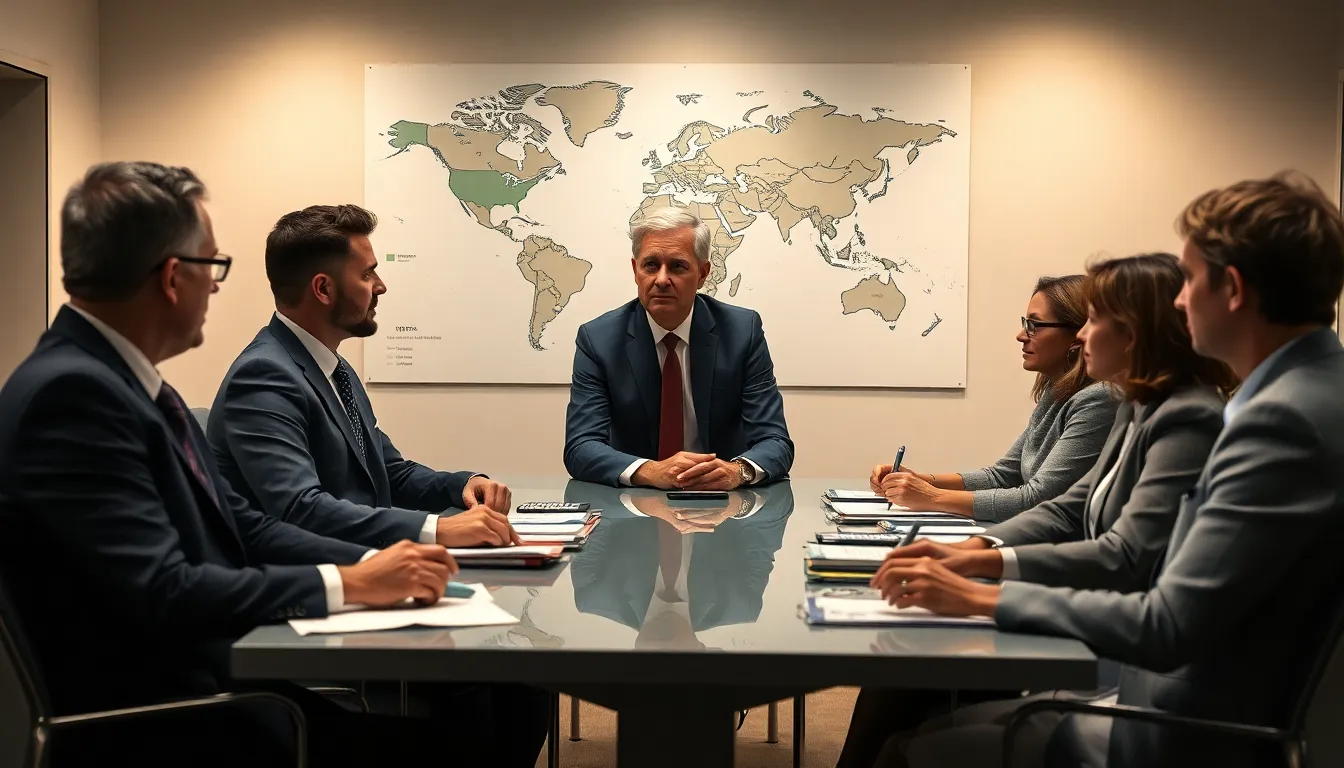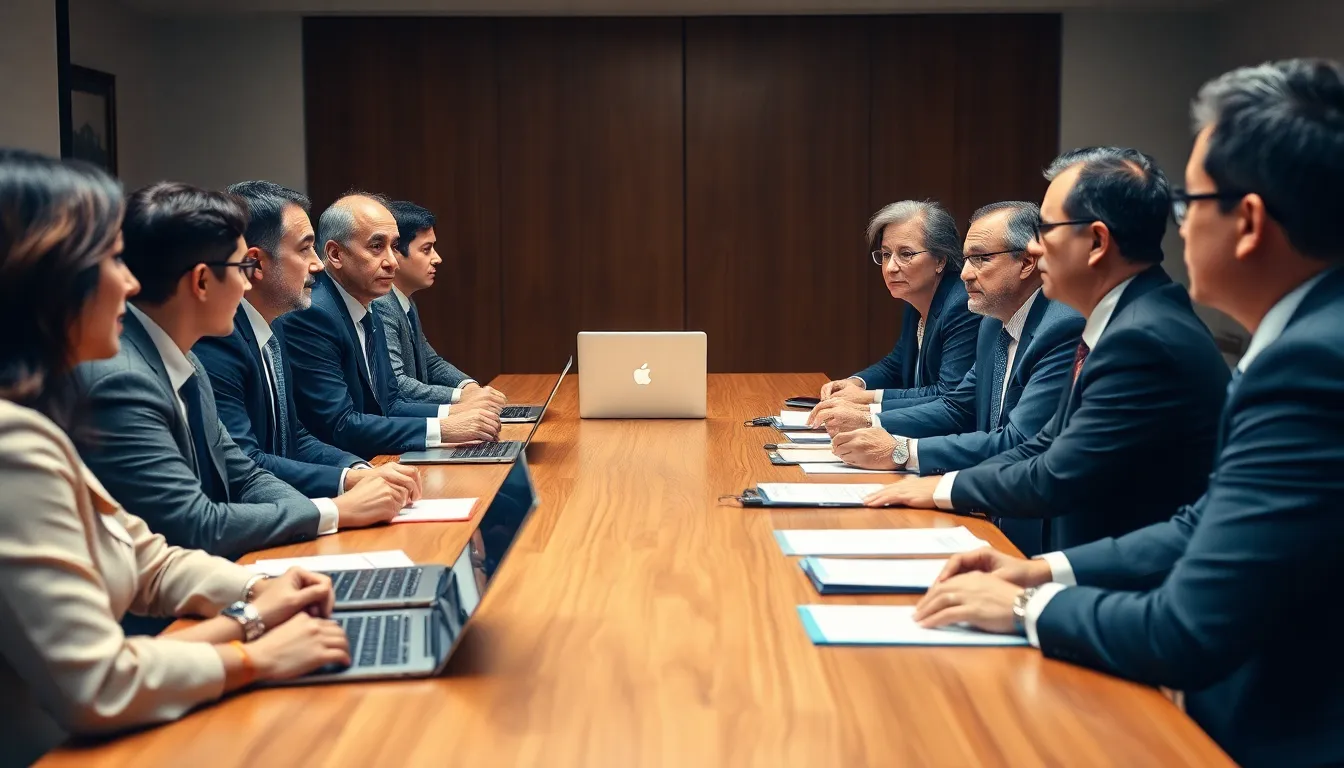Table of Contents
TogglePolitical negotiations are like a high-stakes game of chess where everyone’s trying to outsmart each other while keeping a straight face. It’s a dance of wit and strategy where the stakes are often higher than a politician’s promise. Whether it’s a budget deal or international treaties, these negotiations shape the world we live in, often leaving us wondering if anyone really knows what they’re doing.
In this whirlwind of handshakes and heated debates, understanding the art of negotiation is crucial. It’s not just about who shouts the loudest; it’s about crafting solutions that everyone can live with—preferably without throwing a shoe. Dive into the world of political negotiations, where every word counts and sometimes, a well-timed joke can save the day. Get ready to unravel the secrets behind the closed doors where the future is negotiated, one awkward pause at a time.
Understanding Political Negotiations
Political negotiations involve complex interactions aimed at reaching agreements between parties with differing interests. These processes play a critical role in governance and diplomacy.
Definition and Importance
Political negotiations represent formal discussions to resolve conflicts and achieve consensus. They encompass issues ranging from legislation to international treaties. Crafting solutions that satisfy all parties becomes essential in fostering cooperation and stability. Such negotiations not only influence policy outcomes but also establish frameworks for future interactions. Effectively managing these discussions helps prevent conflicts and promotes a harmonious political environment.
Historical Context
Throughout history, pivotal political negotiations have shaped nations and transformed societies. Events like the Treaty of Versailles in 1919 underscore the significance of negotiation in resolving global issues after wars. The Civil Rights Movement showcased the power of negotiations in social reform, leading to landmark legislation in the 1960s. Notably, the Camp David Accords in 1978 illustrated how diplomacy can achieve peace between conflicting nations. Understanding these historical instances is crucial to grasping current political dynamics and negotiating practices.
Key Elements of Political Negotiations


Political negotiations rely on various key elements that shape their effectiveness. These components include communication strategies, compromise, and concession.
Communication Strategies
Effective communication stands at the core of political negotiations. Negotiators use clear language and tailored messaging to convey their positions. Active listening fosters mutual understanding and builds rapport among parties. Non-verbal cues also play a significant role, as body language can indicate openness or defensiveness. Clarity in presenting facts enhances credibility, making arguments more persuasive. Establishing trust through consistent and honest dialogue often leads to more productive discussions. Engaging in open-ended questions encourages exploration of ideas, revealing underlying interests that may not initially surface.
Compromise and Concession
Compromise and concession are vital for reaching agreements in political settings. Parties often find that flexibility in their demands promotes collaboration. Sometimes, yielding on less critical issues can pave the way for more significant gains. Identifying shared goals helps negotiators align their interests, facilitating concessions that are mutually beneficial. Understanding the significance of each party’s priorities allows for strategic give-and-take, ensuring both sides feel heard. Balancing the need for concessions with the desire to secure core objectives often defines the negotiation’s outcome. Effectively navigating these elements contributes to successful political resolutions.
The Role of Mediators in Political Negotiations
Mediators play a crucial role in political negotiations, facilitating dialogue and helping parties reach agreements. Their expertise helps navigate complex issues and fosters cooperation.
Types of Mediators
Mediators vary based on their roles and approaches. Some act as neutral third parties, such as diplomats or former leaders, facilitating discussions without favoring any side. Others may include professional mediators trained specifically in negotiation techniques. Community-based mediators often work within localized contexts to address grassroots issues. Additionally, facilitators might utilize informal settings to ease tensions among negotiators. Each type brings unique strengths to the negotiation table, enabling a tailored approach to specific challenges.
Effectiveness of Mediation
Mediation effectiveness depends on various factors. Trust between parties significantly impacts the process. High levels of trust encourage open communication and sharing of information. The mediator’s skills also influence outcomes; effective mediators use active listening, clarity, and empathy to foster understanding. Flexibility in approach enables adaptation to shifting dynamics during negotiations. Successful mediation often leads to sustainable resolutions by identifying common interests. By promoting collaboration, mediation reduces the likelihood of future conflicts and fosters ongoing relationships among stakeholders.
Challenges in Political Negotiations
Political negotiations present various challenges that can complicate achieving mutual agreement. Situational factors significantly influence outcomes, including power dynamics and cultural differences.
Power Dynamics
Power dynamics in negotiations can skew the balance between parties. A party with more resources or leverage often holds an upper hand, leading to unequal negotiations. Negotiators must recognize when power imbalances exist. Fear of repercussions can lead to silence, resulting in insufficient dialogue. Understanding this dynamic helps each party devise strategies to address disparities. Partners with similar power levels tend to create more collaborative atmospheres. Implementing strategies to level the playing field promotes equity in discussions.
Cultural Differences
Cultural differences significantly impact communication styles and negotiation approaches. Negotiators should appreciate varying perspectives on conflict resolution, decision-making, and relationship-building. Non-verbal communication varies, with gestures or expressions carrying different meanings across cultures. Tone and formality can also change expectations in negotiations. Awareness of these differences fosters smoother interactions. Building cultural intelligence enhances understanding and reduces misunderstandings. Training in cultural competency can be instrumental in equipping negotiators with the tools they need for effective communication across diverse environments.




